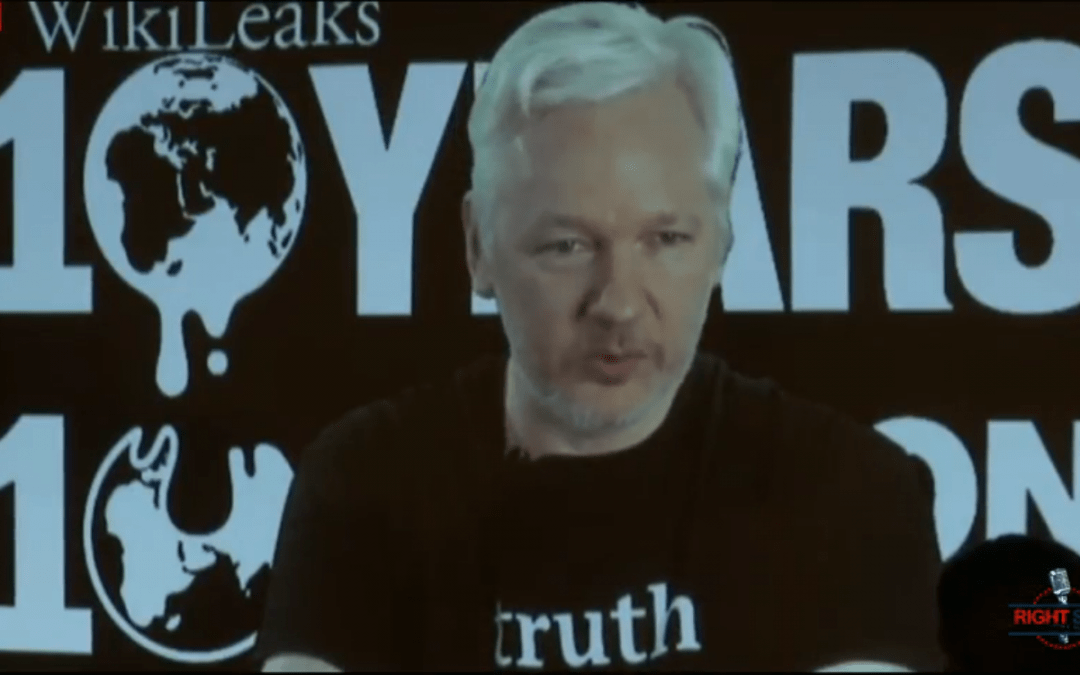WASHINGTON – Journalists and partisans who rose at an ungodly hour Tuesday morning expecting Julian Assange to release a hyped data dump that could possibly damage Hillary Clinton’s campaign instead received a two-hour long Wikileaks commercial.
Their only consolation prize? More hype about upcoming leaks, including one to be released later this week.
“I’ve seen the internet and I know there’s enormous expectation in the United States, but… you have to understand that if we’re going to make a major publication of information to the United States at a particular hour, we’re not going to do it at 3 a.m.,” said the Wikileaks founder at an online news conference celebrating the organization’s 10th anniversary.
Assange Skyped into the event about an hour after it began in Berlin at 10 a.m, Central European Time. That was 4 a.m. Eastern Time.
Evidently, Assange and cohorts found this time more suitable for celebrating past endeavors, promoting their new book, railing against mainstream media “spin,” and asking for increased funding and media partnerships.
The only remotely juicy information was Assange’s announcement that Wikileaks would be releasing one publication per week for the next 10 weeks, with the first one expected later this week. Items pertinent to the U.S. election would be released before November 8.
The leaks will affect “three powerful organizations in three different states,” as well as the U.S. electoral process, he said, and topics will include war, arms, oil, Google, the U.S. election, and mass surveillance, according to Assange.
For weeks, Trump supporters had expected something meatier—the game-changing “October surprise” they thought would be a Clinton-obliterating bonanza. (What this “October surprise” contains, or even if it exists, remains a mystery.)
On Saturday, former Trump campaign advisor Roger Stone tweeted:
Wednesday@HillaryClinton is done. #Wikileaks.
— Roger Stone (@RogerJStoneJr) October 2, 2016
Even as late as Monday, Stone was pledging his faith in Assange’s ability to deliver:
I have total confidence that @wikileaks and my hero Julian Assange will educate the American people soon #LockHerUp
— Roger Stone (@RogerJStoneJr) October 3, 2016
By Tuesday morning, however, Stone was backpedaling, according to the Daily Beast. Meanwhile, alt-right Twitter pundits were in a furor over being “trolled” and conspiracy theorist Alex Jones, who had covered the event live, admitted he’d been “#wikirolled” after previously enthusing over the “historic” event.
Online claims preceding the conference may have built up the hype about what turned out to be a non-event.
On Sunday, little-known website TruePundit.com released a completely unsubstantiated and mocked report alleging Hillary Clinton had proposed a drone strike on Assange. The website attributed this claim to vague “sources.” Its copy of an email allegedly from then-State Department Director of Policy Planning Anne-Marie Slaughter to Clinton aides revealed nothing of the sort.
Clinton’s campaign manager Robby Mook laughed in response, saying he was “reticent” to address any accusations by the “Wikileaks people”:
Nevertheless, Wikileaks retweeted the article, and Assange canceled an event for Tuesday during when he was to appear on the balcony of London’s Ecuadorian embassy. The event was moved to Berlin and he appeared online instead due to unspecified “specific information.”
Previously, Wikileaks published Democratic National Committee emails leaked by hacker(s) Guccifer 2.0 that led to the ousting of DNC chair Debbie Wasserman Schultz.


